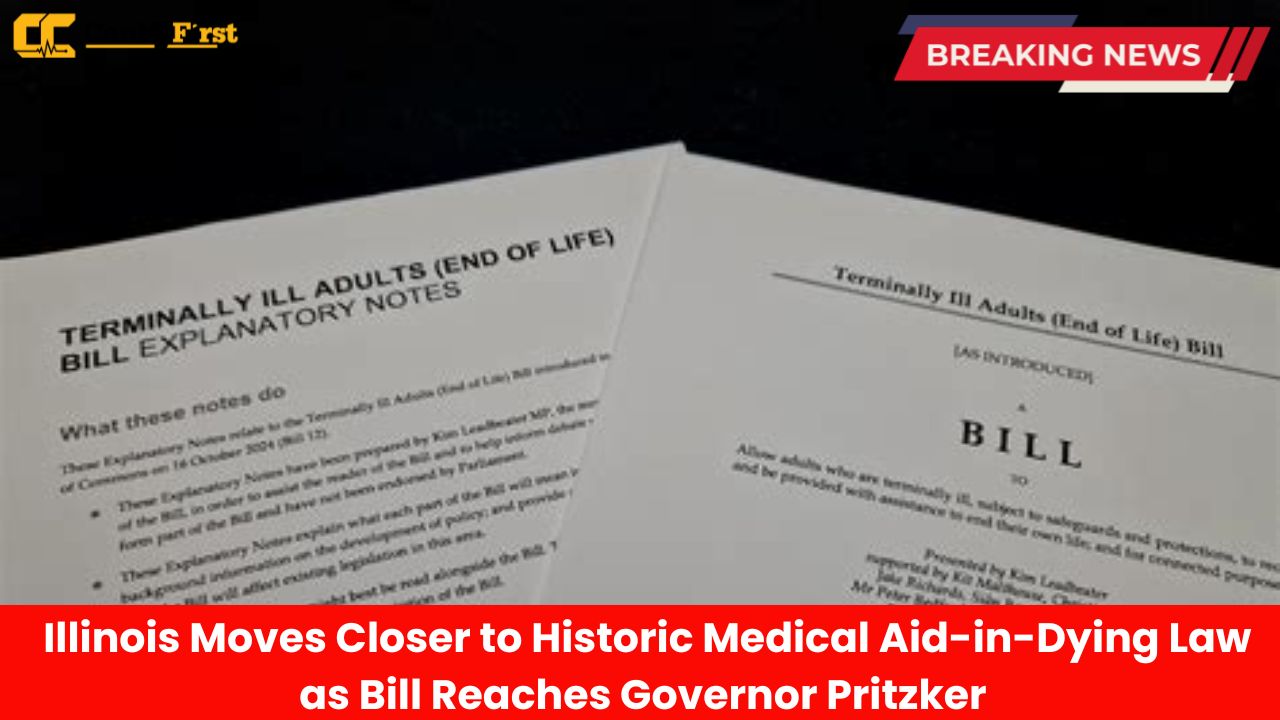Springfield, Illinois: A major legislative milestone has been reached in Illinois as lawmakers have approved a groundbreaking bill that would allow terminally ill adults to seek medical assistance in ending their lives. The measure now heads to Governor J.B. Pritzker’s desk for consideration, marking one of the most emotionally charged healthcare debates in recent state history.
The Bill’s Core Proposal
The proposed legislation, known as the End-of-Life Options Act, would permit mentally competent, terminally ill adults with a prognosis of six months or less to live to request life-ending medication prescribed by a doctor. The measure is designed to give patients greater autonomy over their final days and to reduce suffering when recovery is no longer possible.
According to supporters, the bill includes several layers of safeguards. Patients would have to make two separate verbal requests, at least 15 days apart, as well as one written request signed in the presence of witnesses. Two physicians must confirm the patient’s diagnosis, mental competency, and voluntariness before any medication could be dispensed.
Also Read
A Landmark for Patient Rights
Advocates say this legislation is about providing a dignified choice rather than promoting death. Illinois would become the twelfth state in the country to enact such a law if Governor Pritzker signs the measure.
Supporters, including organizations like Compassion & Choices Illinois, have long argued that individuals facing unbearable pain should have the right to determine how and when they pass away. They emphasize that medical aid in dying is entirely voluntary and tightly regulated, protecting both patients and doctors.
“This bill is about compassion, not coercion. It is about empowering patients to make personal medical decisions with peace and dignity,” said State Senator Laura Fine, who sponsored the measure.
Divided Opinions and Moral Concerns
Despite strong emotional backing, the proposal has drawn significant opposition from religious groups, disability advocates, and some medical professionals. Critics argue that even with strict safeguards, the practice could create moral and ethical challenges, particularly for vulnerable or elderly individuals who might feel pressured to choose death over care.
Faith-based groups have voiced deep concerns, claiming that the legislation undermines the sanctity of life. Some healthcare organizations have also cautioned that the law could blur the line between compassionate care and euthanasia.
State Representative David Friess, who voted against the bill, expressed apprehension about unintended consequences. “We have to ensure our healthcare system is rooted in preserving life and offering hope, not facilitating its end,” he said during the debate.
Growing National Momentum
Illinois’ action reflects a growing trend across the United States, where more states are considering medical aid-in-dying laws. States like Oregon, Washington, California, and Vermont have already passed similar legislation over the past two decades.
In those states, data shows that while relatively few patients actually choose to end their lives through prescribed medication, many find comfort simply in having the option available. Studies have also suggested that the existence of such laws has not led to widespread misuse or abuse.
Governor’s Consideration and Next Steps
Governor Pritzker has not yet publicly stated whether he will sign the measure, but his administration has generally prioritized easing suffering and expanding patient rights. Advocates express optimism that he will add his signature, bringing Illinois in line with other states promoting end-of-life choice.
If enacted, the Illinois Department of Public Health would be tasked with overseeing the program, collecting data, and issuing annual reports to ensure transparency. The law would take effect six months after the governor’s approval, giving state agencies and healthcare providers time to implement necessary procedures.
Emotional Impact on Families
For many families who testified before lawmakers, the bill represents personal closure. Several individuals shared stories of loved ones who endured agonizing pain in their final days, wishing they had the choice to pass peacefully.
One such witness, Chicago resident Melissa Grant, spoke tearfully of her mother’s final hours after a long battle with cancer. “No one should be forced to suffer without relief. She wanted control over her fate and deserved a say in how her life ended,” Grant said.
A Turning Point in Illinois Healthcare Policy
The passage of the End-of-Life Options Act through the state legislature signifies one of the most consequential medical ethics decisions Illinois has ever faced. The debate has transcended political and religious boundaries, igniting conversations about choice, autonomy, and what defines a dignified death.
If Governor Pritzker signs the bill, Illinois will join a growing coalition of states redefining what compassionate healthcare looks like at the end of life. Supporters call it a historic step toward patient empowerment, while opponents warn it raises profound moral questions society must continue to confront.
Conclusion:
The next few days will be pivotal as Governor Pritzker weighs his decision on the End-of-Life Options Act. Whether approved or vetoed, the debate has already reshaped how Illinois views end-of-life care and individual autonomy, marking a defining moment in the state’s evolving approach to medical ethics and human dignity.












